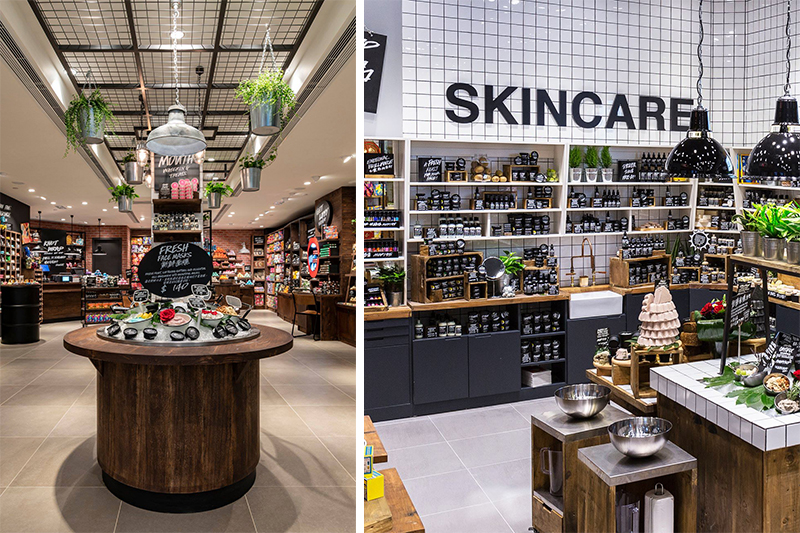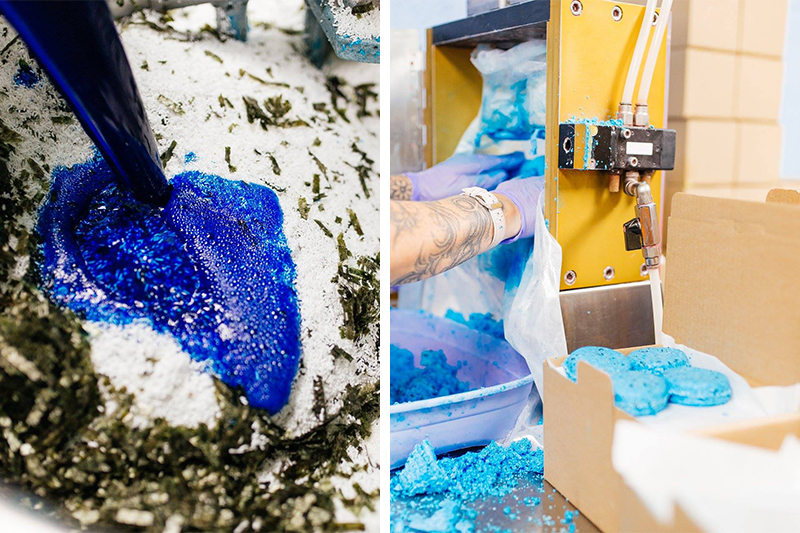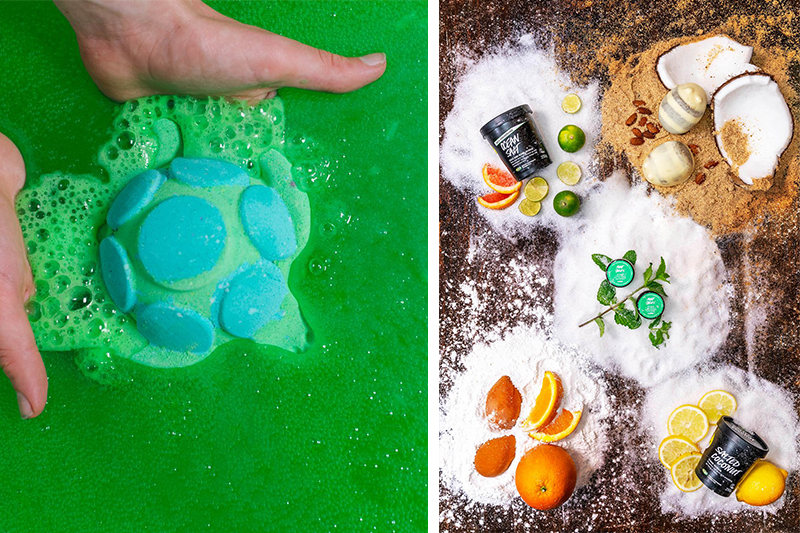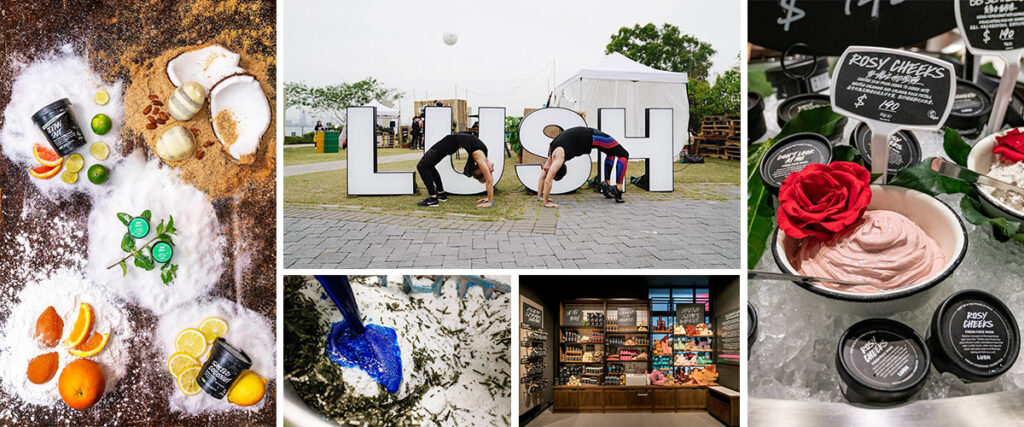Taking it from 0 to 10 stores in the last six years, Annabelle Baker, LUSH’s Asia director, single-handedly revived the UK beauty giant’s dying business in Hong Kong. Read about LUSH’s successful re-entry into the Asia market here.
In the teeming and highly competitive cosmetics market in Hong Kong, the UK natural beauty brand LUSH is one that dominates. Once a small franchise business struggling to gain traction, in just six years, LUSH has grown to make its aromatic presence felt in ten stores dotted across Hong Kong and Macau. Heading up this successful transformation has been Annabelle Baker, the 36-year-old director of LUSH Asia. She sat down with us at the Hive Sai Kung to share the brand’s journey, as well as her tips for success on breaking the Hong Kong market.

Annabelle was just 16-years-old when she embarked on her career with LUSH in 1998 as a part-time sales assistant at its third-ever store on the King’s Road in London. A brand born out of the collapse in 1994 of Cosmetics to Go, a mail-order company, LUSH was the brainchild of Mark Constantine, a herbal trichologist and Elizabeth Weir. Having previously run a business supplying The Body Shop with many of their products, it’s fair to say that the pair knew about natural beauty. Together with three other co-founders, LUSH was launched in a small shop in Poole, Dorset, selling handmade beauty products made from fruit and vegetables bought in local markets. The no-packaging ethos now synonymous with the brand was less a marketing ploy than a necessity – they simply couldn’t afford it. Today, LUSH has over 900 stores in 49 countries around the world.
“I just love the company and the value it represents,” says Annabelle, of what drew her to the brand and still keeps her there today. As an avid environmentalist and animal lover, LUSH’s eco-friendly and cruelty-free ethics resonated with her, making it a natural fit. Working her way up the ladder from part-time work through university to management, Annabelle impressed many along the way, including Constantine. Not only was she sponsored by the company to do an MBA at the Imperial College London, but she was also entrusted to lead various new ventures and foreign launches for LUSH, including its market entry in India and Brazil.
Having boasted a strong track record in her work for the brand, in late 2012, Annabelle was tasked with rescuing LUSH’s franchised business in Hong Kong, which had been struggling to survive amid intense local competition. “The franchised business hadn’t been managed well and was in dire straits,” she explains.“We knew we had a massive potential in Hong Kong, but it wasn’t being realised in that small shop in the World Trade Centre.” That there was potential is certainly true – according to a 2017 market study by international market research firm Nielsen, 96% of female consumers in Hong Kong spend an average of HK$4,021 (US$512) a year in the purchase of skincare or makeup products, making the market hugely profitable.

“Back then, when we saw what other cosmetics brands were doing, we couldn’t quite work out why our sales weren’t doing the same kind of numbers even though the brand had been around for ten years,” says Annabelle. In an attempt to sustain its spot in the market, LUSH decided to take over and relaunch the business themselves. Soon, Annabelle relocated to spearhead the changes. “I’ve always had a strong pull to work in Asia. Hong Kong is particularly interesting to me for there is always a good mix of Chinese and British culture. So although I’ve never been here before, for someone who’s British, it feels quite homey,” Annabelle smiles.
Business-wise, Hong Kong did not disappoint her either. “Many Asia cities have a great level of efficiency and productivity, but in Hong Kong, it’s exceptional,” she explains. “Incorporating business here is simple and can be done extraordinarily fast. We incorporated the company on 15th November 2012, signed the property lease two days later, took possession of our new store on Granville Road in Tsim Sha Tsui two weeks after that and officially opened its doors on 10th January 2013. It only took us five weeks to turn things around. Such efficiency and work ethics have given Hong Kong a strong competitive edge, and also made my job easier,” Annabelle laughs.
Setting up a company in Hong Kong may start up smooth, the task of gaining traction, however, is quite another story. Companies looking to expand into foreign markets are bound to have to cope with location-specific issues, and more often than not, they bring with them extra costs. “LUSH has strict operating procedures in the way we handle wastage, but the biggest struggle we face in Hong Kong is the extra cost that comes with the lack of local wastage infrastructure. For example, we manufacture about 25 products locally using fresh fruits and vegetable production from local farms, compositing the waste from the kitchen. But in reality, the cost of doing that here is way more expensive than that in other European countries,” Annabelle elaborates.

In spite of these challenges, Annabelle has never stopped seeking to improve the customer service at LUSH, which is imperative to drive growth and maintain a loyal clientele. “The focal point for LUSH in Asia is to make shopping locally relevant. People need a reason to go to shops. We are giving them one by creating a special shopping experience,” she elaborates. Having been a sales advisor herself, Annabelle understands that the customers are the pivot of each and every company. For the foreign brand to win back the love of the local customers, it needs to re-adjust its business strategy to be more responsive to their needs. Based on this principle, the setup of each LUSH shop is uniquely arranged according to domestic market needs, so the most wanted products will be the prominent focus.
Social activism has also always been at the core of the LUSH brand. A few years ago, the company took a stand against the fracking industry, which adopts the practice of fracturing rock and extracting gas from the earth using a high-pressure mixture of water, sand, and chemicals. Recently, LUSH launched a new campaign in the UK highlighting problematic issues in the undercover police program, which has stirred up a heated discussion across the country. “As a privately-owned enterprise, the power is in our hands when it comes to shining a light on issues that people genuinely don’t talk about,” says Annabelle. “Hong Kong customers are very focused on animal protection. For that reason, they are more willing to engage with our brand since animal welfare is one of our common causes. Our social campaign is a way we connect and communicate with the local community, not just for marketing causes, but also to provide a voice for those who don’t think they’re heard.”
This mission-driven approach is unconventional for a cosmetics giant like LUSH – yet it’s the impetus for the re-entry of the international brand in the market. LUSH’s turnaround success in Hong Kong bears testament to the brand’s ability to understand the constant market evolution, from the way it views its broader role within society, to the way it communicates and innovates. “We are the market disrupter that creates a new business model where the main goal is to give back to the community and the environment, to ourselves and to the customer, rather than simply maximising profit,” says Annabelle. To achieve this goal, the LUSH team focuses on delivering products that put more into the natural environment than they take out. One of the examples is the invention of LUSH slap sticks solid foundation, which is a major leap forward in reducing plastic packaging without compromising on quality or effect. “We view ourselves as pioneers and innovators in the field of cosmetics, like Apple or Tesla in the tech industry. ”
Today, the LUSH Great China workforce has evolved from a one-person team six years ago into a 300-people army that continues to conquer the hearts of local shoppers with its iconic products and excellent service. Having accumulated 20 years of experience in the cosmetic empire, Annabelle says the most important value to retain is honesty. “Being in a leadership position, you’ve got to live the values you espouse. You must accept that you’ve made mistakes and move on from them. Aim not at the position you want to get to, but at maximising your gain as you work your way up because that learning process is essentially how you get to the point where you want to be.”
Related Articles
10 Must Have APAC BioTech Skincare Products
FRAME Cosmetics: Mediterranean Skincare Beauty from the Inside Out





